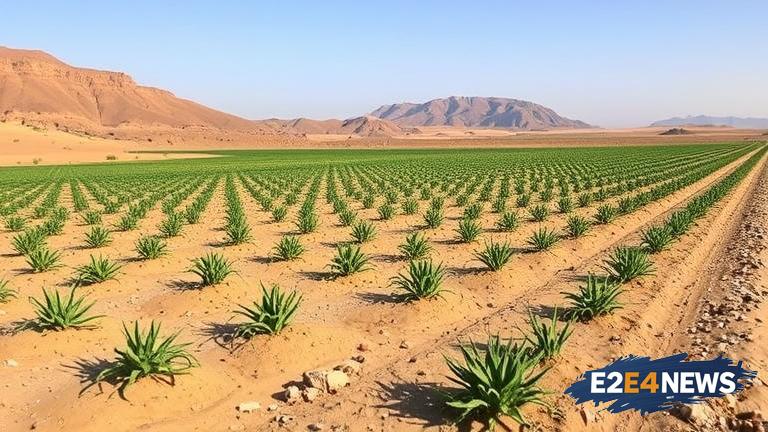Israel has long been a pioneer in agricultural innovation, and its latest endeavors in desert farming are no exception. The country’s agricultural sector has been working tirelessly to develop and implement new techniques to increase crop yields and promote sustainable agriculture in the desert regions. One of the primary methods being used is precision agriculture, which involves the use of advanced technology such as drones, satellites, and sensors to monitor and control crop growth. This approach allows farmers to optimize water and fertilizer usage, reducing waste and minimizing environmental impact. Additionally, Israeli farmers are utilizing advanced irrigation systems, such as drip irrigation, to conserve water and reduce evaporation. These innovative methods have already shown significant results, with some farms reporting increases in crop yields of up to 30%. The Israeli government has also launched initiatives to support desert farming, including the establishment of a new agricultural research center in the Negev desert. The center will focus on developing new technologies and techniques for desert farming, as well as providing training and support for farmers. Furthermore, Israel has been sharing its expertise in desert farming with other countries, including India and Africa, to help promote sustainable agriculture and reduce poverty. The country’s innovative approach to desert farming has also attracted international attention, with many countries seeking to learn from Israel’s experience. The use of renewable energy sources, such as solar and wind power, is also being integrated into desert farming to reduce reliance on fossil fuels. Israeli companies are also developing new technologies, such as vertical farming and hydroponics, to increase crop yields and reduce water usage. These innovative methods are not only beneficial for the environment but also provide new opportunities for farmers and rural communities. The development of desert farming in Israel is also expected to have a positive impact on the country’s economy, with the potential to create new jobs and increase exports. Moreover, the innovative approaches being used in desert farming can also be applied to other areas of agriculture, such as livestock farming and forestry. The Israeli government has also announced plans to increase funding for agricultural research and development, with a focus on desert farming and sustainable agriculture. This investment is expected to further boost the country’s agricultural sector and promote the development of new technologies and techniques. In addition, Israel is also working to promote sustainable agriculture and reduce its environmental impact, with a focus on reducing greenhouse gas emissions and conserving natural resources. The country’s innovative approach to desert farming is a testament to its commitment to sustainability and its determination to become a leader in the field of agricultural innovation. Overall, Israel’s desert farming initiatives are a significant step forward in promoting sustainable agriculture and reducing poverty, and are expected to have a lasting impact on the country’s agricultural sector and the environment. The use of advanced technologies and innovative methods is expected to continue to play a major role in the development of desert farming in Israel, and the country’s expertise in this area is likely to be sought after by other countries in the years to come. As the global demand for food continues to rise, Israel’s innovative approach to desert farming is poised to make a significant contribution to meeting this demand, while also promoting sustainable agriculture and reducing environmental impact.
